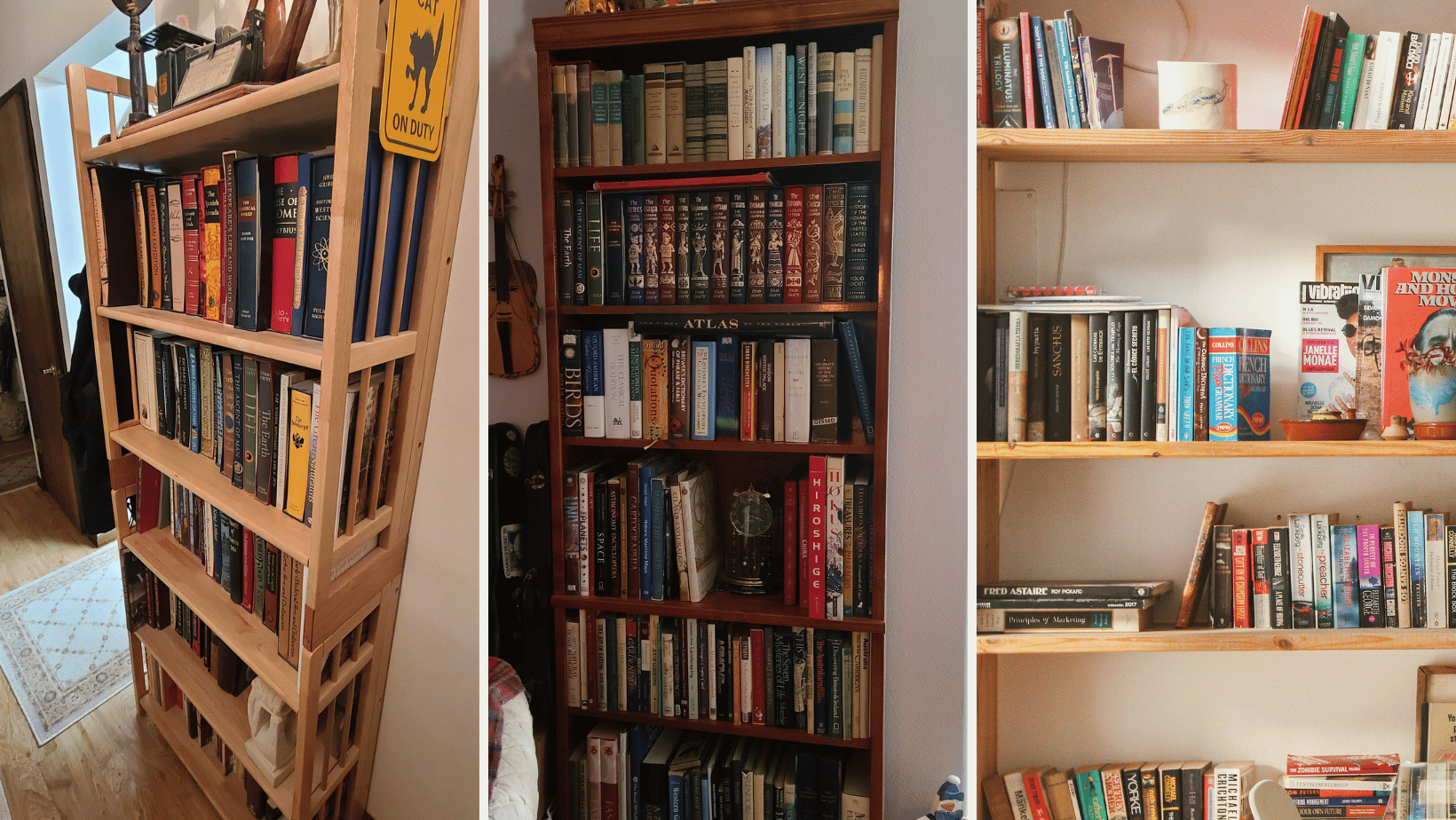 Author: Gabrielle Proust, Proust Dynamic Organizing
Author: Gabrielle Proust, Proust Dynamic Organizing
Two months ago, my housemate inherited over 10,000 books from a family member. To be clear, he already had a personal library of close to 1,000 books.
You may think this was rather an inconvenience to him, but no. Because saying he loves books would be putting it lightly: He is obsessed with books. This devotion was made clear when we moved into the house we bought together and his furniture consisted of:
-1 bed
-1 desk
-1 cat
-10 fully loaded bookshelves
Five minutes after he told me about his inheritance, I casually glanced around our open plan living space.
“That’s quite a few books. Have you thought about where they will go?” I asked calmly.
I may be the queen of the understatement, but I’ve learned in my years as a Professional Organizer to always approach each client with caution and kindness. I leave judgement at the door, focus on empathy and ask questions. My roommate’s collection was no exception.
“Well, I’ve still got room for 3 more bookshelves upstairs – if I stack them. That’s 360 books. And the linen closet is under-utilized. I only need 2 sets of sheets and 2 towels. The rest can go away. That will give me room for 200 more.”
“And the other 9,440?”
I keep my voice level though I feel like asking, “Where in the blue blazes are you going to put 9,440 more books!” This is my house too after all.
Don’t get me wrong. I love books too. I have my own bookshelves and enjoy sitting down to while away the hours getting lost in a good story. My cat fits perfectly on my lap while I read. It’s a slice of heaven.
But there is physically not enough room for 10,000 books in this house.
I rummage through my mind for the best approach in this situation. Two of my favorite acronyms for getting organized pop into my head. They are from Organized to Last, by Porter Knight: FOCUS and RRRIPP.
To find a solution, I need to first FOCUS:
|
Forward thinking: Plan for the long term. What books are you actually going to read in the next few years? Can you borrow them from the library?
Open space: Clear areas for peacefulness and some decorations for your bookshelves.
Concentric circles: Place the most important books closest to where you will use them: career books in the office, light reading near a comfy chair, cookbooks near the kitchen, and so on.
Upright storage: Go up, not out. Are the shelves arranged for maximum storage?
Simple systems: If the system is too complicated you will never use it.
|
“How many of those 10,000 books are you really going to read?” I ask.
“All of them…” he replied, without a hint of irony.
“Really? All of them? There aren’t a few that you won’t touch?” Say maybe 9,440?
“Well, I probably won’t read the 20-volume set on the history of the staple. Or the 960 books chronicling the life of a fruit fly – one volume per hour. You know they can live 40 days?”
“Ok, good start. That’s 980 books you can donate. I’m sure there is someone out there who would just love to read about the…staple…or a fruit fly. Gotta be one person at least.”
Gradually I bring my friend back around to the reality of our situation. There are simply more books than places to put them.
When we are done with FOCUS we move on to RRRIPP:
Refuse: Before accepting new books going forward, remember that it's ok to say no! Say thank you, accept them if you must, but don’t put them on the shelf where they will be forgotten.
Recycle: Eliminate excess by donating books or giving to friends who truly want them.
Refer: Remember that you do not need to be a storage locker for anyone. This is where it is great to work with an organizer. One of my client’s favorite lines is: “my Professional Organizer told me this must be gone by [fill in a date].
Identify: Know what books you own and where they live. This is helpful when you are shopping because now you know what you own and what you do not want more of. We have all bought a second copy of a book we forgot was already on the bookshelves at home.
Post: Block time on your calendar to work on each shelf and bookcase. A little every week gets a lot more done than you imagine because it is not so overwhelming as trying to do the whole library at once.
Put away: Everything should have a “home”. Put it there, so you know where to get it when the time comes to read it / work on it.

What to Do with Donated Books
A couple of weeks later, my roommate and I stood looking down at piles and piles of books to donate. He crossed his arms and looked at me sideways.
“So... what do I do with them now? I don’t want to toss them in the trash. I don’t think I even could."
“Whoa! Hold on there." I say. "You don’t have to trash them! Not at all. Let’s prep the books you want to donate and take them to..."
NAPO GO Month Event When: January 28th 2023 Where: Junkluggers Warehouse / 10950 SW 5th St, Suite 200 / Beaverton OR 97005.
Granted, we still have lots of books to review. But my friend is continually making forward progress. We’ll be attending the NAPO GoMonth event, and hope to see you there!

Author: Gabrielle Proust
NAPO Oregon Chapter President
Proust Dynamic Organizing
proustdynamicorganizing.com